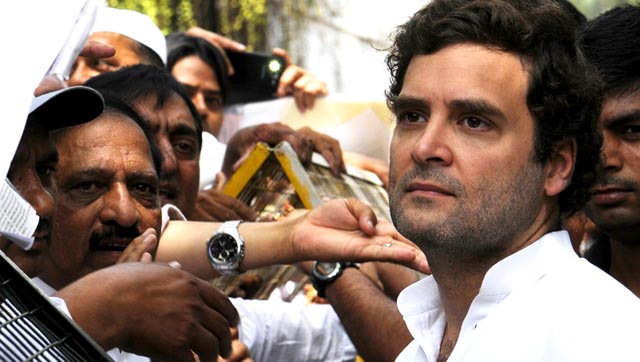Congress vice president Rahul Gandhi’s return from a political sabbatical has been a much-awaited political event. In fact, a bit too much. This is not the first time a leader has fallen off the political radar and Gandhi will not be the last to do so.
The media’s love for the political victor is known all too well. The same courtesy is seldom extended to the political underdog. And no exceptions have been made in Gandhi’s case. From parallels to the return of the Prodigal Son to a homecoming after a ‘vanwas’ to political obituaries, the media has done it all.
However, the media cannot be entirely blamed, for it is reflecting the awfulness uncertainty brings with it. It is the same awfulness that’s seen in Samuel Beckett’s “Waiting For Godot” when Estragon tells Vladimir and Pozzo: “Nothing happens. Nobody comes, nobody goes. It’s awful.”
So what’s the big deal in this ‘return’? The return of Gandhi is essential not only for Congress supporters but for those who love democracy and bet on its survival in the country. Commentators who have written off the Congress after its worst defeat in electoral history–in the 2014 general election in which it won a mere 44 seats–have missed the point.
No doubt the BJP has earned its stripes and has reason to gloat–it’s after three decades that the Lok Sabha saw a single-party majority.
However, it is in such circumstances that the importance of an opposition is highlighted. A strong opposition is required for the required checks and balances on the government. The Congress, with its experience, is the first among equals and is looked up to by other opposition parties when it comes to crucial matters.
To use an analogy from the world of cinema: The importance and glory of the protagonist is challenged and proved only when there is an equally important antagonist. Clark Kent becomes Superman only when there’s a Bizarro or Lex Luthor.
The question is: Will Rahul Gandhi rise to the occasion? Unfortunately, no one knows. The BJP is certain that Gandhi is here only for “item numbers” (to quote party spokesperson Sambit Patra).
The Congress wants us to believe that he is ready to lead the party. Gandhi’s interaction with farmers on Saturday and Sunday is projected as proof of his willingness to lead from the front.
Addressing a ‘kisan rally’ is a right step if one were to look at its political relevance. With the clouds of an agrarian crisis getting thicker with every passing day, Gandhi is taking up the issue at the right time. He missed a great opportunity–probably the biggest show of opposition unity since the JP movement–when Congress president (and his mother) Sonia Gandhi led the opposition march to Rashtrapati Bhavan over the government’s land acquisition bill.
A kisan rally alone, however, will not do. Rahul Gandhi needs to get comfortable with the idea of interacting more with people-and the importance of social media in this effort cannot be ignored.
Throughout history, it’s leaders who have wisely used technology who have succeeded: FD Roosevelt’s use of the radio, JF Kennedy’s use of television and Barack Obama’s use of social media. Closer home, Prime Minister Narendra Modi brilliantly used social media to reach out to the youth.
The opaqueness that surrounds Gandhi is one of the factors that distances him from the public. An aspirational India not only wants to move up the social ladder but also wants to move closer to its leaders. People easily identify with a leader who’s close to them – a quality that made Delhi chief minister Arvind Kejriwal dear to Delhiites.
Sunday’s kisan rally–along with being more accessible and approachable to the public–might be Gandhi’s chance to put to rest all opposing voices, even the ones within the Congress.
It is often said that public memory is short. This is reassuring for sections of the political class that have no qualms in regurgitating unfulfilled promises every five years before an election. But this boon is also a bane. This same fleeting memory will erase from public memory a political leader who’s out of action and who is away from the public gaze.
Soon a time will come when the Congress will not ‘miss’ Gandhi, when the people will not miss a leader and when the media will not dissect on primetime television the reasons for Gandhi’s absence. That’s because political narratives have a cunning way of pushing behind those who refuse to march ahead of time.
Rahul Gandhi should be wary of being pushed behind and should not fall into that abyss of political irrelevance–from where stories of a comeback are categorised as fiction.

